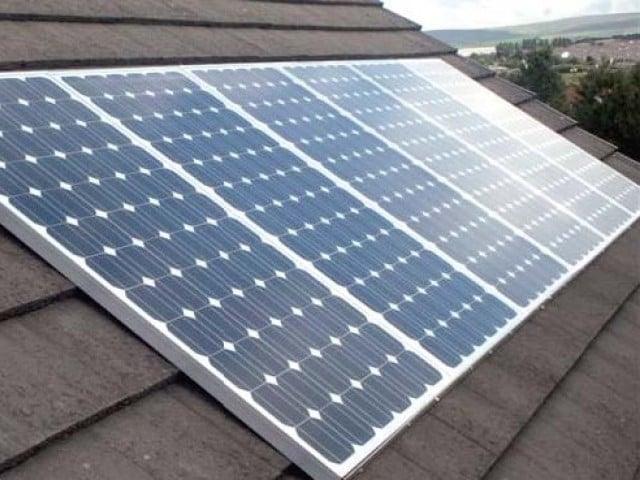Islamabad:
The permanent committee of the National Assembly on finance unanimously rejected the 18% sales tax on Tuesday proposed on the import of solar panels, while the government also announced the withdrawal of another controversial measure to increase the sales tax on hybrid vehicles, reversing both anti-environment initiatives.
The Committee of his meeting, chaired by the member of the National Assembly of the Pakistani Party Party (PPP) (MNA) and the former Minister of Finance Syed Naveed Qamar, also raised questions on the new bill, the 2025 law on the product of the digital presence but has not announced its judgment.
The rejection of the 18% sales tax on the import of solar panels and its parts, as announced by Qamar, is the first rejection of this type by the committee after starting to discuss the finance bill. Unlike the Senate, the decisions of the National Assembly or its permanent committee are binding in the event of a finance bill.
The government had estimated 20 billion income rupees from the 18% sales tax on the importation and supply of photovoltaic cells, whether assembled or not. Since the IMF had not approved the proposal, the rejection by the Committee will have no unfavorable involvement for the IMF program.
During the Committee meeting, the president of the Federal Board of Return (FBR), Rashid Langrial, argued that the sales tax had already been taken from the local assembly of solar panels; Consequently, the rejection of the tax on the import stage could disadvantage the local industry.
However, he could not give firm figures on the part of the local industry in the total sales, but said that a very little percentage had been provided locally. “If the government has not accepted our rejection, the National Assembly opposes it as a veto,” said Qamar.
Qamar asked the government to find other ways to encourage local industry. The Minister of Finance, Muhammad Aurangzeb, said that the era of subsidies on occasion was over. With that, Qamar reminded him that the government had just announced subsidies in the budget of electric vehicles.
In the budget, the government had imposed by 1% to 3% car engine tax to increase 10 billion rupees to finance electric vehicles. “It is a cross subsidy on electric vehicles,” said Aurangzeb. “It is always a subsidy funded by someone else,” replied Qamar.
The government has long tried to discourage the use of solar panels – a cheaper source of electricity – above the costly grid -based power. “No political party in the National Assembly supported the 18% tax and the government will have to withdraw it,” said Qamar. The Minister of Finance recognized the comments.
Hybrid cars
At the same time, the government announced on Tuesday the withdrawal of the proposed increase in the rate of sales tax of 12.5% to 18% on hybrid cars of up to 1800 cc. This would result in a loss of 7 billion potential rupees.
The reduced sales tax rate of 12.5% on hybrid cars would remain, said the president of the FBR, Langrial. Although he told the Committee that the Minister of Finance had announced it in the budget speech, the tax would not be increased.
This is the second time in the past year that the government has announced to increase the rate of sales tax on hybrid cars, but then removed it before the budget approval by the National Assembly. Under automotive policy, the government cannot increase the rate before June 2026.
However, the president of the FBR refused to withdraw the proposed increase in the rate of sales tax for cars of 850 CC of the intermediate income group. In the budget, the government proposed to increase the rate of sales tax over 850 cc of car from 12.5% to 18%.
Langrial said that if a person can buy a small RS3 million car, he can also pay 18% sales tax. It seems that after the budget, small cars will become expensive, but the luxurious SUVs will become cheaper, noted Mna Usama Mela of Pakistan Tehreek-E-insaf (PTI).
The committee had an animated discussion on the question of giving police powers to the FBR and the fear of its abuses by taxes. The entire finance bill is like declaring the martial law on companies, noted that MNA Nafisa Shah pointed out.
However, President FBR made an exception to label the bill as a martial law work. “Hard words like martial law have been used, but I want to clarify that I work for the Democratic government,” said Langrial, before choosing to leave the meeting room.
The Standing Committee has also shown its discomfort about giving the FBR authorities to the local police to trace non -paying cigarettes and confiscate them. The members observed that this would give another window to the police to extract people from the people. “The poor smoke to relieve stress, but the rich can afford a diet coke,” said Sharmila Faruqi.
The Committee has also questioned the new government bill, the law on the product of the digital presence. The bill was presented to charge a 5% tax on the value of online payments made to foreign digital companies like Netflix and Amazon.
The FBR member, Dr. Najeeb Memon, said that the quantum of foreign payments was much more than 300 billion rupees and that the government could easily obtain 15 billion income rupees. He said that credit card payments to businesses like Netflix and Amazon rose to RS300 billion this year. The size of TEMU tax franchise sales was also 4 billion rupees.
The members of the Committee called on to provide the bill as a separate law instead of being part of the finance bill.




